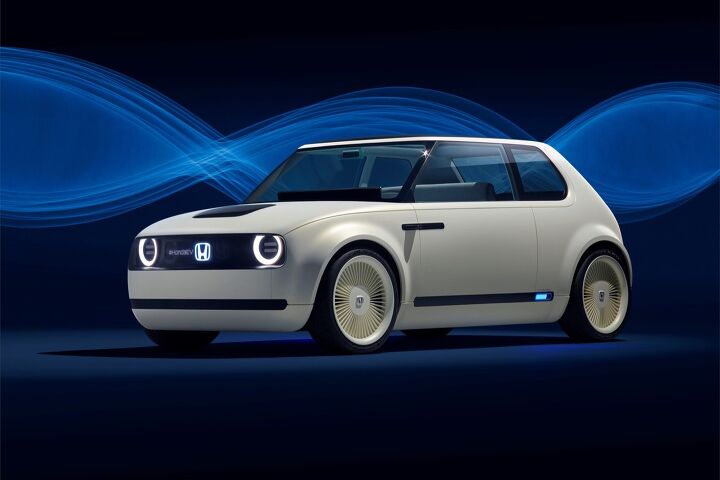Positives and Negatives: Honda Weighing Benefits of Solid-state Batteries

Tightening global emission regulations are pushing the world’s automakers to put all fuel-saving options on the table. Electric cars are an obvious answer, but range anxiety and consumer concerns about battery life continue to dog vehicles powered solely by electrons.
With a finite amount of space in their vehicles, manufacturers are constantly looking for efficiencies when laying out plans for EVs. According to a report from Reuters, Honda is considering developing solid-state batteries for use in their future EVs.
Solid-state batteries have an abundance of advantages over the lithium-ion units found in the majority of today’s electrified vehicles. Relying on a gel- or liquid-based electrolyte, lithium-ion batteries use that fluid as a pathway for electricity as the unit discharges. As with any technology relying on components that are in a state of flux, lithium-ion batteries will eventually weaken and lose performance over time.
Solid-state batteries, as suggested by the name, deploy a solid conductive material instead. This battery type is said to handle thermal loads better than its mundane brethren, while also holding an edge in energy density. Without getting into too much detail and putting everyone to sleep, these advantages will allow EVs that deploy solid-state batteries to potentially operate efficiently in a wider range of temperatures and pack more juice into a smaller battery footprint.
At present, solid-state batteries are eye-wateringly expensive, preventing manufacturers from using them in the current fleet of EVs. As OEMs are not exactly in the business of losing money, this budget-hoovering battery technology has traditionally remained solidly on the R&D back burner.
Now, with most manufacturers bumping up against the limitations of existing battery tech, solid-state batteries are getting a second look. Reuters reports that Honda is looking into sinking a few dollars in the technology, while BMW announced just earlier this week it’s teaming up with an American company called Solid Power. Toyota, which said on Monday that every vehicle it makes will have an electrified version by 2025 (plus ten new EVs by the early 2020s), is also hard at work attempting its own solid-state breakthrough.
Honda showed off several natty EV concepts at various auto shows around the world this year, most notably the retro-themed Urban EV in Germany and the cool Sports EV in Japan. If the House of Soichiro can figure out solid-state batteries over the next five years, you can bet it’ll find its way into production pretty quickly.
[Image: Honda]

Matthew buys, sells, fixes, & races cars. As a human index of auto & auction knowledge, he is fond of making money and offering loud opinions.
More by Matthew Guy
Latest Car Reviews
Read moreLatest Product Reviews
Read moreRecent Comments
- Kwik_Shift_Pro4X What's worse than a Malibu?
- MaintenanceCosts The current Malibu is poorly packaged; there's far more room inside a Camry or Accord, even though the exterior footprint is similar. It doesn't have any standout attributes to balance out the poor packaging. I won't miss it. But it is regrettable that none of our US-based carmakers will be selling an ordinary sedan in their home market.
- Jkross22 You can tell these companies are phoning these big sedans in. Tech isn't luxury. Hard to figure out isn't luxury.This looks terrible, there are a lot of screens, there's a lot to get used to and it's not that powerful. BMW gave up on this car along time ago. The nesting doll approach used to work when all of their cars were phenomenal. It doesn't work when there's nothing to aspire to with this brand, which is where they are today. Just had seen an A8 - prior generation before the current. What a sharp looking car. I didn't like how they drove, but they were beautifully designed. The current LS is a dog. The new A8 is ok, but the interior is a disaster, the Mercedes is peak gaudy and arguably Genesis gets closest to what these all should be, although it's no looker either.
- Ajla My only experience with this final version of the Malibu was a lady in her 70s literally crying to me about having one as a loaner while her Equinox got its engine replaced under warranty. The problem was that she could not comfortably get in and out of it.
- CoastieLenn Back around 2009-2010, a friend of mine had a manual xB and we installed a Blitz supercharger kit. Was a really fun little unit after that.


































Comments
Join the conversation
Everything has a trade off. In the computer world SSDs are fast and have no moving parts, but they wear out with heavy use. That's why they have extra capacity and trim software to replace capacity as it fails. We're just talking pushing electrons here so I'd guess a solid state battery may have this issue as well.
Wish Honda would build that concept car!! It reminds me of my beloved Honda 600 sedans(I owned nine of them at one time). even in an electric only model it would be something I would consider for a second car for local jaunts.